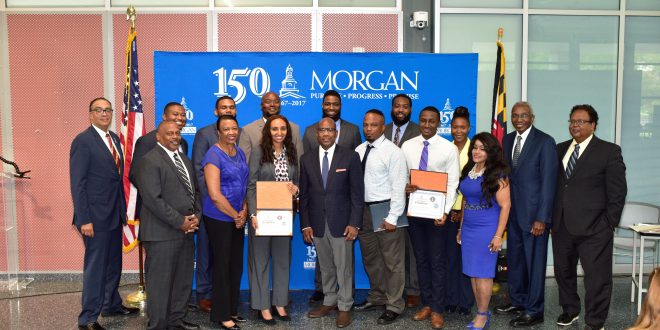Morgan State University (MSU) has recognized the first eight participants who completed the requirements for its Navy-sponsored Master of Engineering in Cyber Engineering (MECE) degree program. The MECE is a joint program involving the Naval Sea Systems Command (NAVSEA), the Strategic Systems Program (SSP) and the Education and Workforce Development/Training Program in Morgan’s School of Engineering. The School of Engineering identifies and recruits candidates, typically newly baccalaureate graduates within the engineering and computer science programs, who meet the U.S. Navy’s employment requirements and the requirements for admission to MSU’s School of Graduate Studies. Once the Navy employs these candidates, they matriculate at Morgan to obtain a MECE degree.
“This is an outstanding program where participants obtain a masters-level degree at an HBCU, i.e., Morgan State University, as well as employment in a critical NAVSEA/SSP technology area in cyber security/engineering,” said Evette E. Wilkerson, the MECE deputy program manager.
The Navy sent its first cohort of eight employees to MSU from various Navy sites in August 2016. Those students have completed all of the requirements for the MECE degree and received a certificate of completion at the ceremony, on Aug. 25, 2017. They will also receive their graduate degrees once final grades and academic requirements have been certified. The benefits of the program included paid academic expenses, tuition, fees, books and the students’ full annual salary while attending the One-Year-On-Campus MECE program.
The MECE degree program is a one-year, 35-credit, traditional Cyber Network and Embedded Systems classroom program, which culminates with a scholarly project and/or capstone project. This program also features Cyber Workforce Certifications. Typically, there are 13 credits in the fall and spring semesters and an additional nine hours in the summer semester with a scholarly project.
Numerous officials from NAVSEA attended the completion ceremony, including individuals from several of NAVSEA’s participating Naval Surface Warfare Center sites and SSP. Morgan President David Wilson and Dr. Gloria Gibson, MSU’s provost and senior vice president for Academic Affairs, attended the ceremony and provided remarks that were very supportive of the program. Dr. Eugene M. DeLoatch, the MECE principal investigator, and Dr. Michael G. Spencer, dean of Morgan’s School of Engineering, were also on hand to demonstrate and express their support. Dr. Craig J. Scott, Chairman of the Electrical and Computer Engineering Department and the MECE Program Manager, provided a detail overview of the MECE Program and the participants’ membership in the National Security Agency (NSA) and Department Homeland Security (DHS), Network Information and Embedded Systems Security Center of Academic Excellence Program (NIESS-CAE). Dr. Victor R. McCrary, MSU vice president for Research and Economic Development and a member of the National Science Board, gave the ceremony’s keynote address.
Morgan’s School of Engineering received startup funds of $1.2 million to develop a dedicated Navy Cyber Engineering Lab/Workspace, tailor the MECE curriculum to make it more Navy-centric and add training to support Cyber Workforce Certifications. The Navy has committed to 10 to 20 students per year for an annual investment of $300,000 to $600,000 in tuition and program costs, pending budget and student availability.
“We are very pleased with the accomplishments of the MECE program and are looking forward to incorporating the Cyber Security Track as a major element or component of our developing professional Master of Electrical Engineering degree,” said Dean Spencer.
 Morgan State University Newsroom Morgan State University
Morgan State University Newsroom Morgan State University







